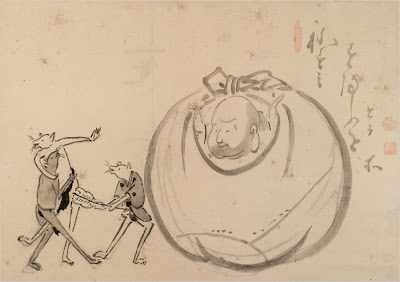
In the days before typewriters.
"What a strange, demented feeling it gives me when I realize I have spent whole days before the ink stone, with nothing better to do, jotting down at random whatever nonsensical thoughts have entered my head." -- Yoshida Kenko.
While this may make the 14th century priest sound like a writer's patron saint, he is satirized as a monkey by Hakuin Ekaku, as reported by a NY Times article about the Zen master's art, now at the Japan Society thru January 9.
He may well have thought writers were and are like monkeys, but master Hakuin is revered and perhaps best remembered for his famous koan:
An ant goes round and round without rest
Like all beings in the six realms of existence,
Born here and dying there without release,
Now becoming a hungry ghost, then an animal.
If you are searching for freedom from this suffering
You must hear the sound of one hand.
Clapping, or perhaps, in NYC, waving down a cab.
